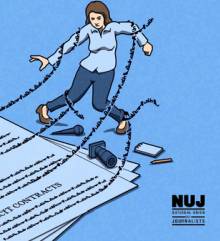Stop the freelance rip-off: letter to MPs

THE NUJ is asking all members to write to your MPs about freelance troubles - and here is a letter that the Branch has sent to London MPs to inspire your personal communication with your own MP. (Find them here.)
Dear [MP] -
As Chair of London Freelance Branch of the National Union of Journalists, which represents over 3500 members, I am asking for your support to remedy the working conditions of freelance journalists.
As part of the government’s initiative launched in July 2025 to improve terms for small business, the Department of Business and Trade has held an open consultation to examine late payments [which closes on 23 October].
At our monthly London Freelance branch meetings, our members raise payment issues they regularly experience when engaged by major news platforms. Below I have set out the main issues our members endure. Frequently they report being unable to challenge conditions “offered” to them for fear of losing work.
Kill fees: A newspaper commissions an article for an agreed fee. The journalist delivers copy on time and to the expected quality. The news agenda changes, and the space for which the article was intended is filled with something else. The journalist is told that they will receive a “kill fee”- likely to be half the agreed fee. Some major outlets pay nothing. In no other industry is such a practice tolerated.
Payment on publication: A newspaper commissions an article for an agreed fee. The journalist delivers copy on time and to the expected quality. For some reason publication is held over, sometimes for months or even years. The journalist waits for remuneration for an indefinite period. Sometimes the article is abandoned without even offering a “kill fee”.
Implicit contracts: A news platform makes use of a piece of work in a way not expected or agreed to by the journalist who is its original author - publication in another form, or overseas, for example. The journalist challenges the publisher, saying: “I didn’t agree to this”. The publisher argues that by offering their work to the publication, a freelance journalist implicitly agrees to its “known terms of business”.
Self-billing: Many news platforms operate a system under which contributors don’t invoice for their work, but receive a payment authorised by their commissioning editor. Often this runs smoothly. However, news platforms also use this system to underpay contributors. When this occurs, there is little scope for a freelance to gain redress.
These abuses occur because of the vast economic disparity between freelance journalists and the organisations for whom most of us work. News platforms take the attitude that if freelances don’t accept these conditions, they can find work elsewhere.
To my branch members this seems like exactly the kind of situation about which Prime Minister Keir Starmer was speaking when he launched this consultation: “From builders and electricians to freelance designers and manufacturers - too many hard-working people are being forced to spend precious hours chasing payments instead of doing what they do best - growing their businesses.
“It’s unfair, it’s exhausting, and it’s holding Britain back. So, our message is clear: it’s time to pay up.”
It would be possible to outlaw all these unfair practices in the reforms that should flow from this government consultation.
When these changes eventually come before Parliament, I am asking you to support proposals that would improve the lot of a group of workers who endure terms that in any other industry would be considered intolerable.
If I can provide any further information or put you in touch with constituents who have experienced some of these abuses, I will be happy to do so.
 Stop the freelance rip-off on the consultation
Stop the freelance rip-off on the consultation
 Stop the freelance rip-off nuj.org.uk
Stop the freelance rip-off nuj.org.uk
 Find an MP parliament.uk
Find an MP parliament.uk
![[Freelance]](../gif/fl3H.png)